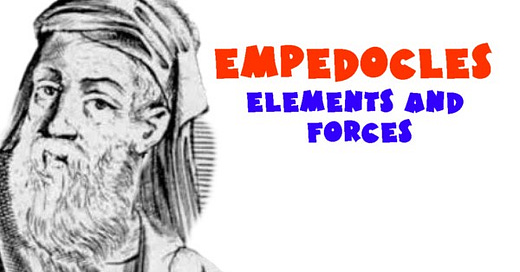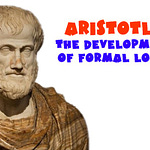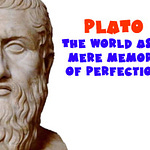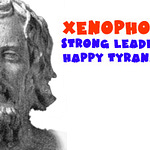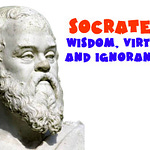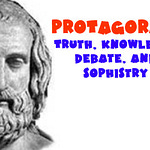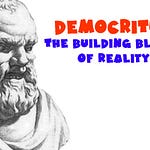Paid subscribers will have access to this and all other videos and bonus content. Please consider upgrading to a paid subscription to enjoy and support this project.
You can also obtain the benefits of a paid subscription by sharing Three Minute Philosophy with others. For each new friend you bring in, you earn benefits. So spread the word!
For the full archive of videos so far, visit https://www.speterdavis.com/philosophy/
Empedocles was a Greek philosopher who lived around 450 BC in Sicily. If you’re wondering why so many Greek philosophers lived in Italy rather than, well, Greece, it’s because back in these times the southern bits of Italy and Sicily were part of Greece. The Roman Republic hadn’t yet expanded much outside of the actual city of Rome.
Very similar to Pythagoras and his mentor Pherecydes, Empedocles philosophy was grounded in mysticism, and also like those other guys he was kind of a cult leader. He claimed to be divine and have magical powers.
But he also studied and expanded upon the work of the more secular philosophers who came before him, and in a lot of ways he was somewhat of a synthesis of all the Greek philosophy so far.
Empedocles didn’t really agree with the Eleatics and thought the whole thing about movement being impossible was kind of absurd, so he took another look at what the Ionians were cooking with their air, water, and fire business.
What Empedocles decided was they were kind of all onto something, but rather than everything being made out of one substance, maybe the key was that they were all right. So he came up with the idea o the classical elements, four substances that everything in the world was made out of—water, air, fire, and earth.
This enabled Empedocles to theorise about how what things were made of affected their behaviour, for example things with a lot of air in them went up and things with a lot of earth in them went down. We now know this isn’t exactly how it works, but you have to admit it’s not completely not how it works.
He was actually kind of on the right track. And this was true for a lot of the stuff Empedocles came up with. He was kind of a genius ahead of his time, like Tesla, but also like Tesla he was completely bonkers.
Empedocles was a highly regarded Pythagorean, which was both a school of philosophy and a religion, so they had all the quirky ideas about triangles and reincarnation and hating beans, but also had a really good understanding of how to think of things scientifically, and Empedocles certainly didn’t disappoint. He laid the groundwork for not just the theory of elements but also the theory of forces—the explanation for why things move even though they’re not alive.
The ancient Greeks knew about forces such as gravity, buoyancy, drag, lift, and they even knew about magnetism due to the discovery of natural magnets called lodestones. But even though Empedocles mastery of the elements seemed like magic he still developed a rudimentary theory about what was actually going on.
He thought that the world was permeated by two fundamental forces he called love and strife. As you might expect, love is the force that brings things together and strife is the force that drives them apart.
Empedocles’ concept of strife was also very similar to what we now call entropy—the tendency for things to move away from order and toward chaos.
If these parallels with modern scientific developments aren’t enough already, Empedocles also came up with a theory for the origin of life that was kind of eerily similar to the theory of evolution, although the similarities are probably a coincidence. Even so, it’s still notable that the mechanism he proposed was a form of natural selection and adaptation.
He thought that in the very beginning the Earth gave rise to all the various components of living things that randomly assembled themselves into things that nine times out of ten looked like Lovecraftian monstrosities, and the ones that weren’t suited to their environment, for example they had no nose and couldn’t breathe, died out in favour of configurations that actually worked.
It's uncertain what this period of world history might have looked like but it would probably have made a pretty good horror movie.
For every one of Empedocles’ theories that was on the mark, there were others that turned out to be much less accurate. For example, he thought that we breathe through the pores in our skin and that light shoots out of our eyes and bounces off objects and that’s how sight works. That’s vaguely on the right track but it’s a better description of barcode scanners.
Empedocles achievements are often overshadowed in history in favour of his eccentricities, like Pythagoras before him, and legend has it that he died by jumping into the fires of Mt Etna, the Sicilian volcano, in order to prove that he was a god, and depending on which reports of the time that you believe, he either proved his divinity and ascended to an afterlife on the moon, or he… you know, the more realistic thing that happens when you jump into lava.
Still, Empedocles might be the most important presocratic philosopher in terms of how much he achieved scientifically, and the only reason you don’t learn his name in school is because he never came up with a cool theory about triangles.
Sources:
Warren, James., Presocratics. Acumen, 2007
Adamson, Peter., Classical Philosophy: A history of philosophy without any gaps. Oxford University Press, 2014
Russell, Bertrand., A History of Western Philosophy. Simon & Schuster, 1945.
Kingsley, K. Scarlett., Empedocles. Stanford Encyclopedia of Philosophy, 2024.
What you get for subscribing:
Three Minute Philosophy is a fun and educational series of videos and essays about the history of philosophy.
Essays are free. Paid subscribers will gain access to full videos, printable PDFs, and possibly more in time.
Listen to this episode with a 7-day free trial
Subscribe to Three Minute Philosophy to listen to this post and get 7 days of free access to the full post archives.


